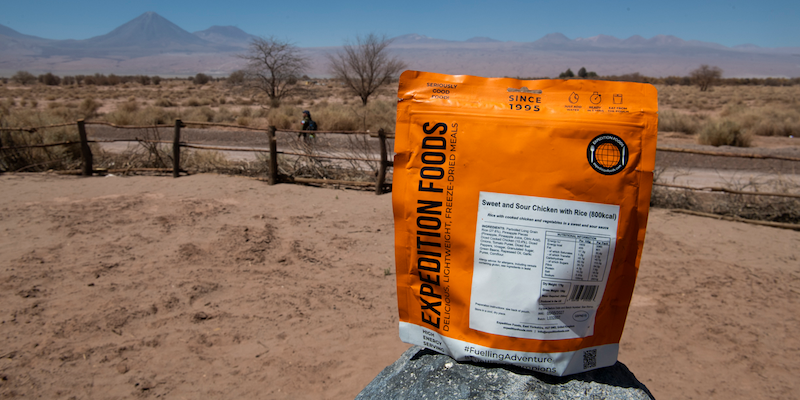-
Meals
-
Ration Packs
-
Special Diets
- Survivor Foods 25-Year Tins
-
Snacks, Drinks & Accessories
- About Us
Eco-Challenge Fiji - Team Checkpoint Hunters
October 27, 2020
Eco-Challenge Fiji consisted of 671km / 417 miles of mountains, rivers, swamps, jungles and oceans. With 31 Checkpoints and 5 legs, this is dubbed "The World's Toughest Race".
We were lucky enough to learn about it first hand from Nienke Veeneman, member of Team Checkpoint Hunters and Eco-Challenge Fiji competitor.
Tell us a little about the race, what exactly is an Eco-Challenge?.
Simply put, an Eco-Challenge is one of the world’s toughest races. It’s an expedition against the clock in which international teams of adventure athletes race non-stop, 24-hours a day across hundreds of miles of remote backcountry terrain. You do this through various sports. This Eco-Challenge consisted of canoeing, sailing, hiking, mountain biking, climbing, SUPing and rafting.
Each team consists of four competitors and must include at least one member of each gender. All teams are supported by an assistant crew member who is responsible for resupplying the four athletes at key points along the course.
You must navigate through the backcountry using only a map and a compass. Smart phones and GPS devices are strictly prohibited. If a team loses a member along the way, whether due to injury, exhaustion or disagreement the whole team will be disqualified.

Who are Team Checkpoint Hunters? How did you meet?
We are a group of friends from The Netherlands, we all met at the local scouting group in Losser. Some years later we all went to a Survivalrun club where we practice our sport. Survivalrun is an up-and-coming sport in the Netherlands where you need to run a distance between 8 and 21km and in this trail you need to overcome some really technical obstacles.
Our trainer was familiar with adventure racing and that is how we got interested in it. In the Netherlands, the races are no longer than 12 hours. So, we went to Germany where we did some 24- and 32-hour races. After this, we knew for sure we wanted to do some more extreme adventure races around the world.
When did you start training? Can you tell us a little bit about your training schedule?
Our training started six months before the Eco-Challenge. The reason that we didn’t train any longer for this event was because we didn’t know if we would be selected to participate at the Eco-Challenge Fiji. At the time we finally received a phone call that we were selected our team was pretty fit, but needed to prepare for the mountains, the jungle and the open water stages. Our main focus was that we needed to become extremely fit in endurance strength. We trained (almost) always together.
Before we were allowed to participate at the Eco-Challenge, we needed to get some certificates to ensure that we would be safe in wild water, climbing, first aid and jungle navigation. It took us 5 months of lessons to obtain all of the certificates.
Every week we trained at least four days a week. Three times in the evening from 6 pm to 9 pm and one weekend day for longer hours. We spent one night a week preparing all of the other things like: flights, materials, food, etc. So, we were preparing for the Eco-Challenge 5 days a week.

What gear did you use during the race, was there anything that you think stood out as a must-take? Or anything you'd leave behind next time?
I needed to grab the gear list to see what we actually needed. The items that we used the most were our backpacks. The guys were carrying backpacks of 40L and for me (the girl), I had a backpack of 30L. Those backpacks were our homes for 11 days and we needed to carry everything by ourselves. The most important things we had in the backpack were:
- A Hammock (It was not always possible to put a tent down in the jungle)
- Emergency bivvi sack, this was our sleeping bag to stay warm in the jungle. You would think that the nights in jungle would be warm but they were not...
- A spare set of dry clothing so you could go in your sleeping bag with dry clothes and could be warmer to sleep.
- A headtorch with lots of spare batteries because in Fiji the nights were 12 hours of darkness.
- A compass.
- Some dry bags to be sure that our spare clothing and sleeping bags would be dry at any time.
- A machete, it’s sounds funny, but we were glad that we were carrying two of them. I think that if we didn’t have one at some points we would not have been able to finish the race.
- Climbing gear and life jackets.
- Lots of food and a Camelbak.
One thing that I would like to carry a next time in the jungle would be waterproof socks. We thought that it was unnecessary but during the race our feet were fully transformed into jungle feet (trench foot). With the waterproof socks this might have been reduced and maybe less painful.
How did you arrange your nutrition? What did you eat during training and the race itself?
During the day we ate a lot of sports bars, sometimes with nuts, sometimes with chocolate, sometimes something else. Preferably a lot of variation. This was so that the food continued to taste good to us and it was less difficult to eat enough. As soon as the sun had set, we took a break and had a warm meal from Expedition Foods. This was a moment to look forward to and it also set a certain rhythm.
How did you manage to stay hydrated? Did you add electrolytes to your water?
We agreed to remind each other every 20 minutes to have a drink. We could often get drinking water from the organisation, from a rain barrel at a local village and sometimes we got it from a river. It was very important that we purified all the water. We always added Hadex to make sure the bacteria were dead, and we wouldn't get sick. Fiji does not have the pure tap water as we know it here.
In addition, we often added isotonic powder in our water bottles for some flavour and extra calories. Sometimes we did add extra salts, but just when we thought we needed it.
In some villages we got fresh coconuts from the locals, the coconut milk always tasted very good to us! Mostly because it didn’t taste like chlorine. Another recommendation is the moisture from sugar cane. It tastes like soda and is full of sugar!

What was the toughest part of the Eco Challenge? Did you ever consider giving up?
In my opinion the hours that we needed to push our bikes through thick layers of mud up the hill were hell. The wheels wouldn’t turn anymore. All the mud got stuck to the bikes which made them very heavy. The only option left was to carry our bikes on our shoulders, this took us at least 6 hours.
However, this wasn’t our most intense moment of the race. This moment was at the top of the waterfall where we discovered that Tom's feet were covered with trench foot wounds. The pain was too bad to carry on. The medics told us that we needed to rest and to do anything to make Tom’s feet as dry as possible for as long as possible.
This was the only time that we considered giving up the race. We had agreed that we would always take one night of sleep before giving up. So, after one long night of sleep, all the luck was with us. Tom’s feet were pretty dry, and he was able to stand and walk.
The rest of the crew felt physically recovered after the many hours of sleep. We packed our bags and continued with the race. We were so lucky that we took this rest because the next stage was brutal with lots of water and swimming. After we finished this stage we were back in the game and believed in ourselves and that we could finished the race.
How were the team dynamics? Any issues at all?
Team dynamics were really, really good. I think that one of the things that sets our team apart is we are really close. We’ve been training together for years now, so we know all of each other’s good and bad habits.
During the race we had lots of fun and didn’t have one fight. When someone was struggling, someone else was able to take over his job such as card reading or carrying some extra materials. And even when someone was too exhausted, we stopped to make some food for the whole team. During this cooking time the one who needed the sleep the most was able to have a quick powernap. We were a real team.

What's next? Do you have any races lined up in the near future?
We had many plans for 2020, we wanted to walk the GR20 in Corsica and participate in the ITERA in Scotland. Unfortunately, it wasn’t possible due to Covid-19.
In the future we would like to do the things we missed this year, and we want to participate in the Raid in France. But we really hope to be selected again for Eco-Challenge 2021 in Patagonia!
Finally, do you have any tips for others aspiring to take part in an Eco-Challenge?
You should not always immediately think that something is too ambitious. Before we competed, it seemed impossible for me to participate in this race and make it to the finish line. We have now proven to ourselves that anything really is possible.
Also in Stories

Jacob Myers’ Surreal Journey to Antarctica
January 23, 2025
Jacob Myers recounts his surreal journey to Antarctica, fuelled by Expedition Foods.

Government Recommended Emergency Kit
November 21, 2024

Karakoram Mountains of Northern Pakistan
October 25, 2024


